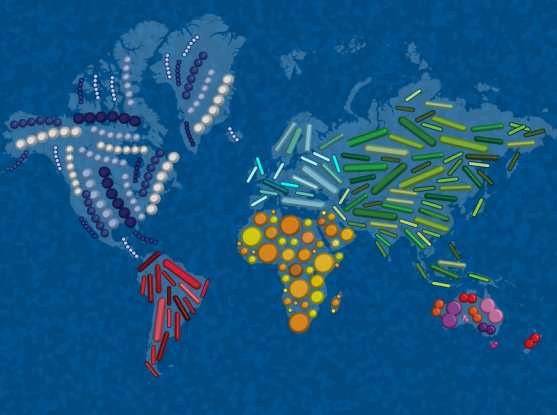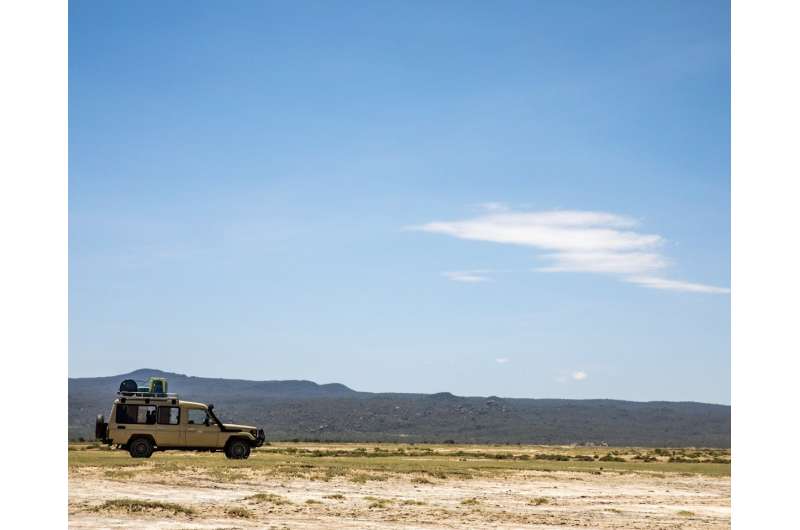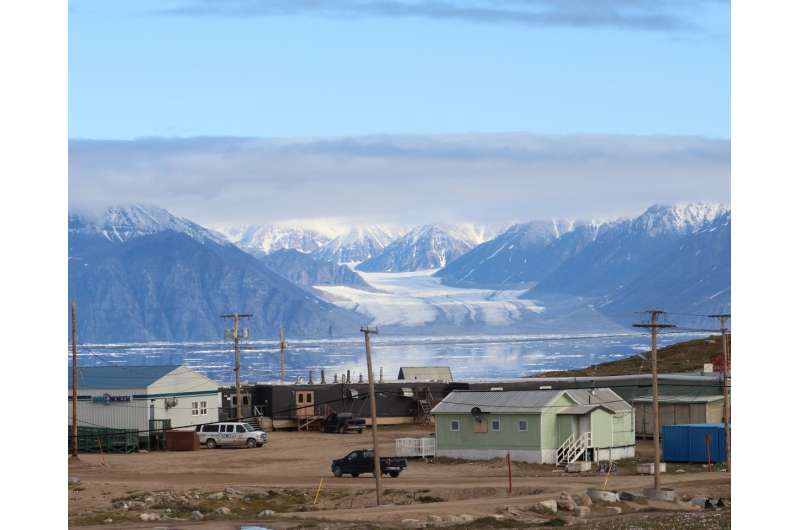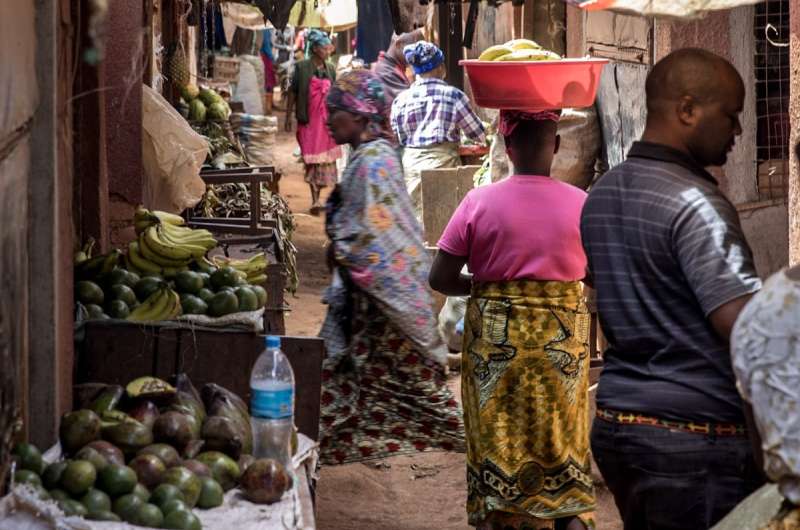Researchers aim to catalogue global microbiomes—while there's still time

In any rapidly changing environment, there are winners and there are losers. The human microbiome—the vast community of microbes that live in and on the human body—is no exception. As scientists gain a deeper understanding of the microbiome's complex ecology, particularly in the gut, it is increasingly clear that our microbiome's diversity, globally speaking, is under threat. Spreading industrialization and urbanization, diets dominated by processed foods, industries that promote antibiotic use—all are slashing gut microbe diversity.
Remarkably, these perils loom just as researchers are unraveling the microbiome's secrets, especially how certain types of gut microbes can fuel—or fend off—disease.
"There is a critical connection between autoimmune disorders and a decline in gut microbe diversity," said Ramnik Xavier, a Broad Institute core member and co-director of the MIT Center for Microbiome Informatics and Therapeutics (CMIT), who led a 2015 study of Finnish infants genetically predisposed to type 1 diabetes. "These and other discoveries begin to paint a picture of the 'missing microbiome' and underscore the importance of identifying gut microbes that may be depleted from industrialized societies."
Now, a team of scientists based at CMIT and the Broad Institute is launching a large-scale, international project to catalog, preserve, and explore the global diversity of human gut microbes. Known as the Global Microbiome Conservancy (GMC), this non-profit collaboration is collecting stool and saliva samples from people living in both urban and remote communities in countries across the globe. As of today, the sweeping effort includes some 40 organizations worldwide and has already amassed hundreds of samples representing diverse communities living in Arctic areas and West and East African regions.
"There's an incredible amount of gut microbial diversity out there that remains associated with people living traditional lifestyles," said Eric Alm, a Broad Institute member and co-director of the CMIT. "Once urbanization and industrialization happen, this huge reservoir of biodiversity will essentially be lost."

The tip of the microbial iceberg
Alm and his colleagues got an early glimpse of just how much microbial diversity is at stake when they ventured to the South Pacific islands of Fiji in 2011. The researchers set out to explore the microbiomes of people living in remote, isolated communities, instead of the highly connected urban centers in North America, Europe and Asia that have been typical fodder for microbiome-focused projects.
The variety they glimpsed was astounding. For example, tucked among the billions of gut microbes in people of the U.S., it is fairly common to find a handful of different types of bacteria that belong to a large group known as Prevotella. Yet in Fijian samples, the team identified hundreds of distinct Prevotella forms.
"We didn't even know that so many variants of this organism existed," said Alm. "Just in this one context, we saw all this diversity that might be hugely important for human health."
Going global
To preserve this biodiversity, postdoctoral researchers Mathieu Groussin and Mathilde Poyet from the Alm lab and Ainara Sistiaga from Roger Summons' lab at MIT launched the GMC in 2015. They serve as the project's lead scientists and have worked over the last two years to build the necessary scientific and administrative infrastructure to support an ambitious, worldwide effort.

That includes a living bacterial "seed bank" that houses and preserves unique types of bacteria found in gut microbiome samples. These bacterial strains could hold important clues about susceptibility to—or protection from—a host of conditions, including inflammatory bowel disease, type 1 diabetes, and other immunological disorders.
The nuts and bolts of populating this seed bank are far from simple. Groussin, Poyet, and Sistiaga work with local communities to collect stool samples from volunteers and quickly freeze them for shipment back to Cambridge. "It's really important that we preserve the bacteria in the samples, keep them alive, so we can grow them later in the lab under anaerobic conditions that mimic the human gut," said Poyet. The vast majority of gut bacteria will only grow in such oxygen-poor conditions, which Poyet and her colleagues can create using specialized chambers that control the levels of oxygen and other gases. The seed bank now holds some 10,000 gut bacterial strains preserved from volunteers' samples, and genomic characterizations have already revealed a variety of unknown bacterial species. Over the next few years, Poyet and her colleagues aim to store around 100,000 such strains.
Another key aspect of this global project is its deep collaborations with a broad group of anthropologists. Sistiaga, who is trained as an archaeologist, is helping to build this worldwide network. "We're reaching out to scientists who partner with and study local communities with traditional lifestyles, like the Hadza hunter-gatherers in Tanzania and the Baka people in Cameroon," she said.
Science serving people
The science isn't the only thing about the GMC that stands out. The project stems from some noteworthy agreements with individual participants and organizations. That includes a contract stipulating that no organization—not MIT, the Broad, or any local institution—owns participants' samples, including the DNA and bacteria within them.
"Participants remain the owners of their own material and essentially their own biodiversity," said Groussin. "This is really out of respect for the local people who make our work possible. If at any time a participant chooses to withdraw and have their samples returned or discarded, we must comply."

In a similar vein, the GMC's leaders are thinking deeply and carefully about how to harness the biodiversity they collect. Some important aspects—such as future therapeutic development—are under discussion and not yet finalized.
"We're still working out what's the most fair and ethical way for the people who contributed their own biodiversity to see a successful therapeutic come to market," said Alm. "Right now, we're building the seed bank and we'll share it with other researchers and with companies, but it comes with an agreement that you cannot directly commercialize the material itself."
While these important discussions continue, the project continues to move forward, propelled by the urgency of disappearing microbial diversity. The GMC is rapidly scaling up and will mark the launch of their work in Asia—specifically Malaysia—in the coming weeks. This expansion also includes an effort to recruit a wider net of collaborators, including graduate students, postdocs, and other scientists with an interest in the microbiome, international travel, and field work.
The GMC's push comes at a crucial moment. As lifestyles in some developing countries shift toward more industrialized and urbanized habits, people are increasingly vulnerable to the same non-communicable, microbiome-associated conditions that are now deeply rooted in Western societies. At the same time, these communities can be poorly equipped to tackle major health challenges in part because they lack the necessary infrastructure, including scientific and medical resources. The GMC hopes to help fill this gap.
"Anticipation and action are absolutely critical," said Groussin. "They are critical for preventing the future loss of beneficial bacteria and for minimizing the future burden of microbiome- and urban-related diseases. The Global Microbiome Conservancy, through its unique seed bank, aims to catalyze research in these important areas by scientists across the globe."
Provided by Broad Institute of MIT and Harvard



















